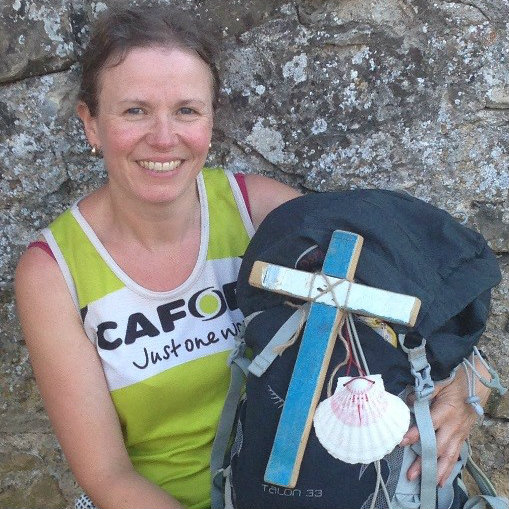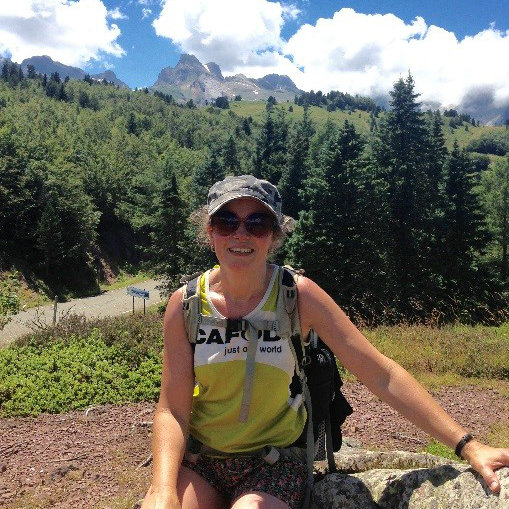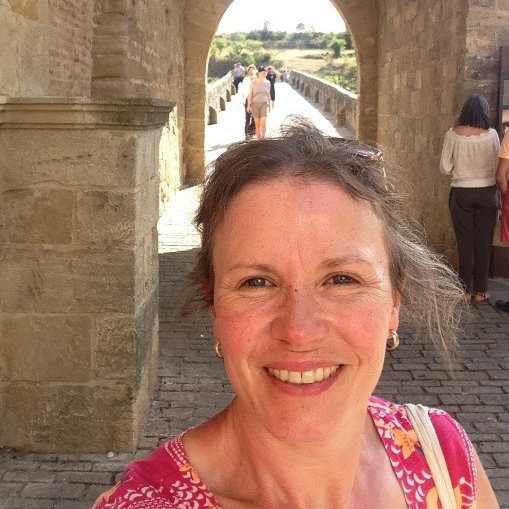Pilgrim Judith’s symbol of suffering is also one of hope

This year, November marks the end of the Extraordinary Jubilee of Mercy. Leah Parker-Turnock spoke to one CAFOD supporter, Judith Tooth, who was inspired by her faith to undertake a pilgrimage along the Camino de Santiago to stand in solidarity with refugees.
Central to Judith’s pilgrimage were those affected by the global refugee crisis. “Walking a pilgrimage can be challenging,” said Judith. “But it’s nothing compared to the perilous journeys so many refugees face. As I walked the long, hot road, I tried to imagine being on such a journey, and, worse, being separated from my four children, not knowing when, or even if, I’d see them again. It was unbearable to think about. And thousands of families are still trying to escape war, poverty and persecution, often only to be met by hostility and further hardship.”
Judith carried a special cross on her journey – the Lampedusa cross. In 2013, hundreds of refugees who were fleeing Eritrea and Somalia drowned off the coast of Lampedusa. Francesco Tuccio, a carpenter from the small Italian island, was moved to gather the driftwood from the wrecked boats and turn them into crosses. He offered the crosses to survivors as a symbol of their rescue and a sign of hope.
Learn more about the Lampedusa Cross
The cross was also a powerful symbol for Judith throughout her pilgrimage: “I fixed the 30cm cross to my backpack along with my scallop shell – the symbol of the pilgrim route. Fellow pilgrims were profoundly moved when I explained to them that the carpenter had offered the crosses he’d made to survivors as a symbol of their rescue and a sign of hope, and that I was carrying one of those crosses to continue that message of hope.

“The cross was a powerful reminder that, throughout this Year of Mercy, though we may feel helpless, praying, raising awareness and campaigning for justice for all those seeking refuge are important and valuable acts.
“Sometimes I held the cross in my hands, feeling the roughened edges and peeling paint, trying to picture the boat it was once a part of. At times it was almost overwhelming, given the history of the wood, and all those who never completed their journey. But although the Lampedusa cross is a stark symbol of suffering, it is – more importantly – one of hope.”
Throughout her two-week trek, Judith shared the experience with fellow pilgrims, sharing stories and songs as they walked, and talking of different countries and cultures. Together, they walked in the footsteps of countless other pilgrims who had passed before them over the centuries, in a continual path of prayer, faith and hope.
Send your own messages of hope to refugees
For Judith, it was a fruitful journey: “Packed tightly into my rucksack was my chosen book for the pilgrimage, The Birthday Boys by Beryl Bainbridge. Ironically this book is also about a journey. One passage revealed itself to me:
‘It may be that the purpose of the worst journey in the world had been to collect eggs which might prove a scientific theory, but we’d unravelled a far greater mystery on the way – the missing link between God and man is brotherly love.’
“For me this was rather poignant because being on a pilgrimage, immersing myself in beautiful landscapes, brings me closer to God. When you climb to the top of a mountain and forget everything else, you appreciate God at a deep level. On a pilgrimage you are also meeting and sharing a tiny part of life’s journey with the people you meet, while walking in solidarity with refugees.

“In the story I read, these men endured terrible physical challenges and hardships, and, while their purpose was to make a scientific discovery, they unravelled a far greater mystery: by caring for each other, it brought them closer to God and to each other.”
Download your own Year of Mercy prayers
During the Year of Mercy, many others like Judith have found their own ways to be merciful. Since Pope Francis called on us to “show mercy in welcoming others and to help the vulnerable to be fully a part of our communities”, CAFOD, along with CSAN and the Jesuit Refugee Service, launched a Year of Mercy campaign. As a result, we have received over 18,000 messages of hope from over 150 schools, parishes and communities in support of refugees.
These messages have been collected and shared with refugees in the UK and around the world – a bright light of love, kindness and hope in a time of darkness. On Saturday 3 December we are holding a prayer service in Salford diocese to celebrate the end of the Year of Mercy. You are warmly invited to attend – please sign up to come to the service
Reblogged this on CAFOD Leeds Blog.
Reblogged this on CAFOD Leeds Blog.